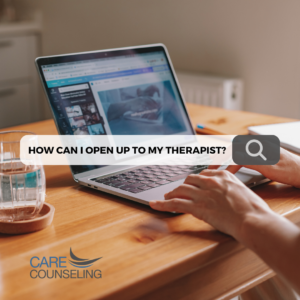How to Open Up to Your Therapist
 Seeking therapy is a brave step towards better mental and emotional health. However, the effectiveness of therapy largely depends on your ability to open up and share your thoughts and feelings with your therapist. If you find it challenging to express yourself during therapy sessions, you’re not alone. In this blog, we’ll explore valuable strategies and tips on how to open up to your therapist, creating a space for healing, growth, and self-discovery.
Seeking therapy is a brave step towards better mental and emotional health. However, the effectiveness of therapy largely depends on your ability to open up and share your thoughts and feelings with your therapist. If you find it challenging to express yourself during therapy sessions, you’re not alone. In this blog, we’ll explore valuable strategies and tips on how to open up to your therapist, creating a space for healing, growth, and self-discovery.
Understanding the Importance of Opening Up
Before we delve into the how, let’s briefly touch on the why. Opening up to your therapist is crucial for several reasons:
- Effective Treatment: To receive effective therapy, your therapist needs to understand your thoughts, emotions, and experiences fully. The more you share, the better they can tailor their approach to your unique needs.
- Emotional Release: Verbalizing your thoughts and feelings can provide emotional release and relief. It can help you process difficult emotions and gain insight into your challenges.
- Building Trust: The therapeutic relationship is built on trust. Opening up fosters trust and strengthens the therapeutic bond, creating a safe space for personal growth.
- Self-Discovery: Through honest self-expression, you gain a deeper understanding of yourself and your inner world. This self-discovery is a valuable part of the therapeutic process.
Practical Strategies to Open Up in Therapy
Now, let’s explore practical strategies to help you open up to your therapist:
- Reflect on Your Goals:
Before each session, take a moment to reflect on what you want to achieve. Setting clear goals can provide a sense of direction and purpose for your therapy.
- Trust the Process:
Trust that your therapist is there to help and support you. They are trained to create a safe and non-judgmental space for your healing journey.
- Start Slowly:
If you’re hesitant to dive into deep and personal topics right away, that’s okay. Start slowly by discussing less emotional or challenging subjects. As you build trust and comfort, you can gradually address more profound issues.
- Be Honest About Your Hesitations:
It’s perfectly acceptable to share your concerns and hesitations about opening up. Your therapist can provide guidance and reassurance, helping you work through these barriers.
- Use Journaling:
Journaling outside of therapy can be an excellent way to organize your thoughts and feelings. You can share your journal entries with your therapist to facilitate discussions.
- Practice Mindfulness:
Mindfulness exercises, such as deep breathing or meditation, can help you stay present and reduce anxiety during therapy sessions. These practices can also help you connect with your emotions more easily.
- Focus on the Present:
While it’s essential to explore your past experiences, also focus on the present moment. Discussing current challenges and emotions can be a less intimidating way to open up.
- Express Your Emotions:
Don’t hesitate to express your emotions during therapy. Tears, laughter, anger, and frustration are all valid expressions of your inner world.
- Ask for Clarification:
If you don’t understand something your therapist said or if you need more clarity on a topic, ask questions. Seeking clarification can lead to more productive discussions.
- Be Patient with Yourself:
Opening up in therapy is a process that takes time. Be patient with yourself and recognize that it’s okay to take small steps.
Challenges You Might Face
Opening up in therapy can be challenging, and you may encounter obstacles along the way. Here are some common challenges and how to address them:
- Fear of Judgment:
Remind yourself that therapists are trained to be non-judgmental and empathetic. Sharing your experiences and feelings is part of the therapeutic process.
- Shame or Guilt:
Understand that many individuals carry feelings of shame or guilt, which can be addressed in therapy. Your therapist can help you work through these emotions.
- Difficulty Expressing Emotions:
If you have difficulty identifying or expressing your emotions, discuss this with your therapist. They can provide tools and exercises to help you become more emotionally aware.
- Past Negative Experiences:
If you’ve had negative experiences with therapy or counseling in the past, share these concerns with your current therapist. They can tailor their approach to your needs and address any lingering anxieties.
Opening up to your therapist is a vital step in your healing journey. By setting clear goals, trusting the process, starting slowly, and being honest about your hesitations, you can create a safe space for self-discovery and emotional growth..



























